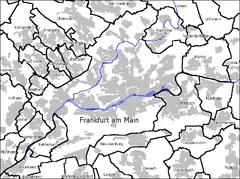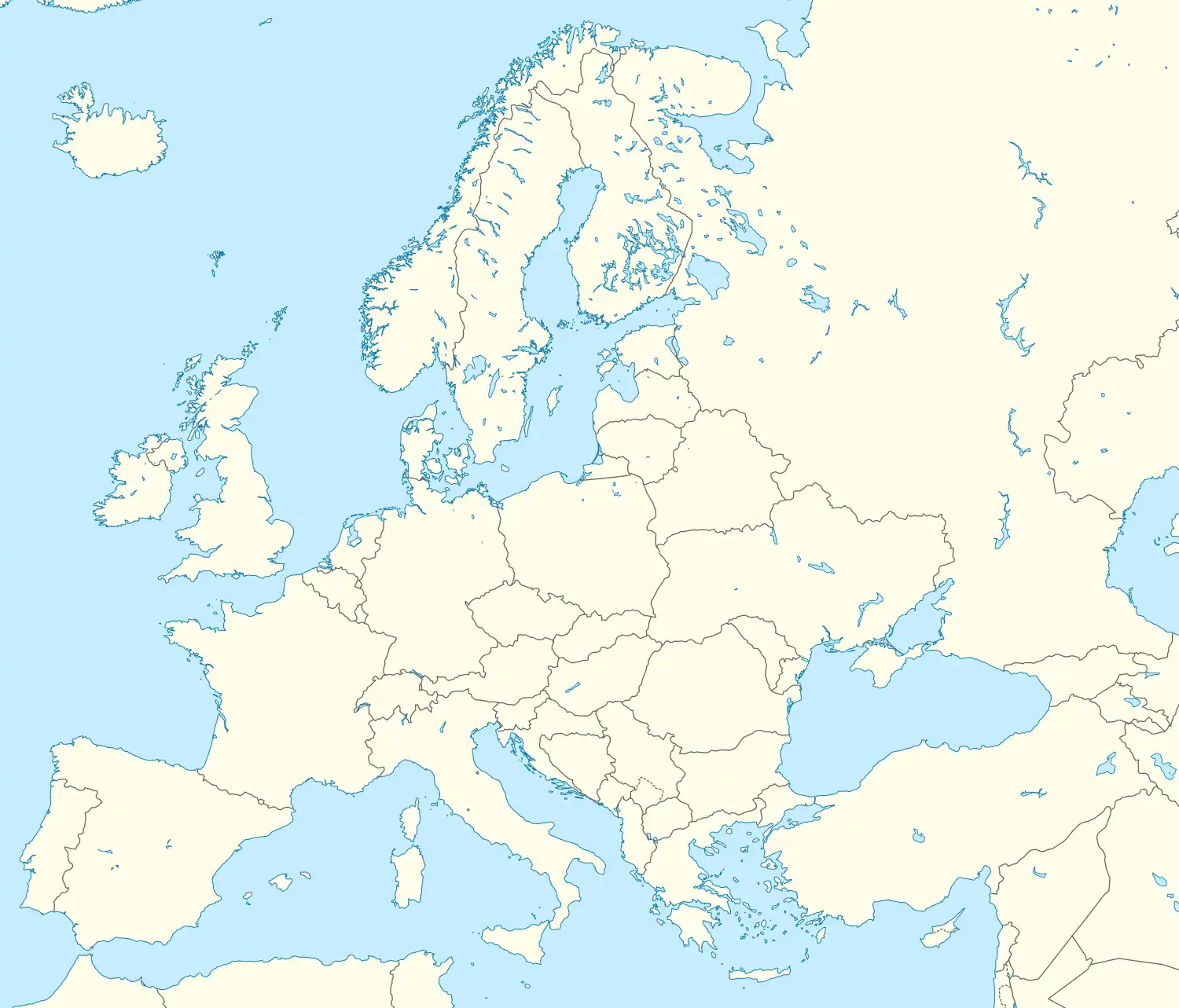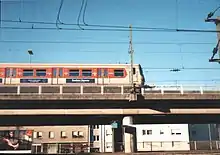Frankfurt (Main) West Frankfurt Westbahnhof | ||||||||||||||||||||||||||||||||||||||||||||||||||
|---|---|---|---|---|---|---|---|---|---|---|---|---|---|---|---|---|---|---|---|---|---|---|---|---|---|---|---|---|---|---|---|---|---|---|---|---|---|---|---|---|---|---|---|---|---|---|---|---|---|---|
| Through station | ||||||||||||||||||||||||||||||||||||||||||||||||||
 DBAG Class 423 approaching the elevated section | ||||||||||||||||||||||||||||||||||||||||||||||||||
| General information | ||||||||||||||||||||||||||||||||||||||||||||||||||
| Location | Kasseler Str. 7, Frankfurt, Hesse Germany | |||||||||||||||||||||||||||||||||||||||||||||||||
| Coordinates | 50°07′09″N 8°38′22″E / 50.11917°N 8.63944°E | |||||||||||||||||||||||||||||||||||||||||||||||||
| Line(s) |
| |||||||||||||||||||||||||||||||||||||||||||||||||
| Platforms |
| |||||||||||||||||||||||||||||||||||||||||||||||||
| Construction | ||||||||||||||||||||||||||||||||||||||||||||||||||
| Architect | Julius Eugen Ruhl | |||||||||||||||||||||||||||||||||||||||||||||||||
| Other information | ||||||||||||||||||||||||||||||||||||||||||||||||||
| Station code | 1858 | |||||||||||||||||||||||||||||||||||||||||||||||||
| DS100 code | FFW | |||||||||||||||||||||||||||||||||||||||||||||||||
| Category | 3 | |||||||||||||||||||||||||||||||||||||||||||||||||
| Fare zone | ||||||||||||||||||||||||||||||||||||||||||||||||||
| Website | www.bahnhof.de | |||||||||||||||||||||||||||||||||||||||||||||||||
| History | ||||||||||||||||||||||||||||||||||||||||||||||||||
| Opened | 1848 | |||||||||||||||||||||||||||||||||||||||||||||||||
| Services | ||||||||||||||||||||||||||||||||||||||||||||||||||
| ||||||||||||||||||||||||||||||||||||||||||||||||||
| Location | ||||||||||||||||||||||||||||||||||||||||||||||||||
 Frankfurt (Main) West Location within Frankfurt  Frankfurt (Main) West Hesse  Frankfurt (Main) West Location within Germany  Frankfurt (Main) West Location within Europe | ||||||||||||||||||||||||||||||||||||||||||||||||||
Frankfurt (Main) West station (German: Bahnhof Frankfurt (Main) West or Frankfurt Westbahnhof) is a railway station for regional and S-Bahn services in Frankfurt, Germany, on the Main-Weser Railway, in the district of Bockenheim, near the Frankfurt Trade Fair grounds and the Bockenheim campus of the Goethe University Frankfurt.
History



The station was opened as Bockenheim station in 1849 during the construction of the Main-Weser Railway from Frankfurt to Kassel. The then independent city of Bockenheim was until 1866 in the territory of the Electorate of Hesse-Kassel. The station building was built in a relatively elaborate Renaissance Revival style to a design by Julius Eugen Ruhl.

The first major change in the railways to affect Bockenheim station occurred in 1888 with the opening of the new Frankfurt Central Station. As part of this project a connection was opened on 10 May 1884 from Bockenheim to the Homburg Railway, a connection that could not be built fifteen years earlier during the Homburg line's original construction because the various small states involved failed to come to an agreement.
In addition, a sweeping curve was built for the Main-Weser line's northern approach to the new Central Station. The old ran from the old Main-Weser terminus to Am Hauptbahnhof (the square in front of the Hauptbahnhof) along the current Kaiserstraße and then turned north. Its abandoned path to Bockenheim was turned into a street, which was initially called Bahnstraße, and it is now a series of streets: Hamburger Allee, Friedrich-Ebert-Anlage and Düsseldorfer Straße.
Modern station
In 1913, the station was renamed Frankfurt West. The historic station building was destroyed in World War II. A modern functional building was built in 1961. During the building of the S-Bahn in the 1970s most of this station was demolished and replaced by a simple building, which seems to be tucked under the elevated S-Bahn line.
The current station has two levels. The ground level is used by regional trains and S-Bahn S6 trains towards the city on platforms 3, 4 and 5. The S-Bahn lines S3, S4 and S5 and S6 towards Friedberg use an approximately one kilometre long elevated section with a two-track elevated station (platforms 1 and 2).
Services
Line 17 of the Frankfurt tramway, which opened in 2003, touches the southern end of the Westbahnhof (Nauheimer Straße and Kuhwaldstraße stops). The tram stop on the forecourt of Westbahnhof was last served by the extended tram line 16 in July and August 2019 due to construction work on the tram network.
The M32 bus line runs from Westbahnhof via Frankfurt Nordend and Bornheim to Ostbahnhof. The M36 bus line connects Westbahnhof with Johann-Wolfgang-Goethe University and the city centre, and the M73 bus line connects the districts of Hausen, Praunheim and Nordweststadt. The planned ring tram will have a stop called Westbahnhof in the neighbouring Schloßstraße.
The regional express trains RE 30 Kassel - Marburg - Gießen - Frankfurt (Main-Weser-Express) and RE 99 Siegen - Gießen - Frankfurt (Main-Sieg-Express) as well as all through trains of the Niddertalbahn (RB 34) to Frankfurt Hbf stop mainly during rush hours. In addition, the Mittelhessen-Express (RB 40/41) always stops at this station.
Some ICE and IC trains in the direction of Kassel-Hamburg or Heidelberg-Karlsruhe (IC/ICE line 26) stop at the station as scheduled. From December 2021, double-decker IC trains will serve Frankfurt Westbahnhof every two hours (IC line 34).
References
- ↑ "Tarifinformationen 2021" (PDF). Rhein-Main-Verkehrsverbund. 1 January 2021. p. 132. Retrieved 8 April 2021.
- Landesamt für Denkmalpflege Hessen (Hesse State Conservation), ed. (2005). Eisenbahn in Hessen. Eisenbahnenbauten- und strecken (Railways in Hesse. Rail construction and lines) 1839–1939 (in German). Stuttgart: Theiss Verlag. p. 197. ISBN 3-8062-1917-6.
- Schack, Martin; Langner, Ulrich (2004). Neue Bahnhöfe : die Empfangsgebäude der Deutschen Bundesbahn 1948–1973 (New stations: station buildings of the German Federal Railways from 1948 to 1973 (in German). Berlin: Neddermeyer. ISBN 3-933254-49-3.
